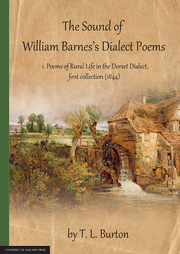Preface
Published online by Cambridge University Press: 05 October 2013
Summary
William Barnes (1801–1886) is a brilliant lyric poet whose work has been marginalized because his best poems are written in a despised rural dialect that snooty metropolitans regard as a vehicle fit only for use by country bumpkins. But when his poems are heard read aloud in the pronunciation of his own time and region, they come to life in a remarkable way, with all their humour, their pathos, and their power. There is, however, no general consensus amongst current readers as to the pronunciation in Barnes's own day of the dialect in which the poems were composed. Whatever the individual merits of recordings made by current speakers of Dorset dialects, there are numerous differences in pronunciation amongst them, and none of them reproduces the dialect quite as Barnes represents it.
William Barnes's Dialect Poems: A Pronunciation Guide (2010) sets out to rediscover the pronunciation that Barnes used in his own very popular public readings of the poems in the mid nineteenth century. The guide is accompanied by a CD containing audio recordings of eighteen poems demonstrating the pronunciation recommended in the book. Why, then, is it necessary to produce a phonemic transcript and an audio recording for other poems that Barnes wrote in the dialect? If the guide does its intended job, won't readers be able to work out the pronunciation of any of his poems for themselves by listening to the recordings, reading the book, and putting its advice into practice?
- Type
- Chapter
- Information
- The Sound of William Barnes's Dialect Poems , pp. xi - xiiPublisher: The University of Adelaide PressPrint publication year: 2013



